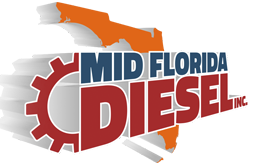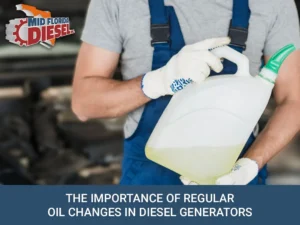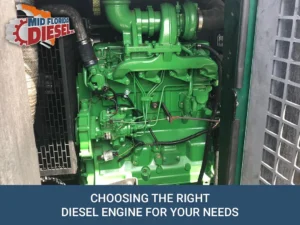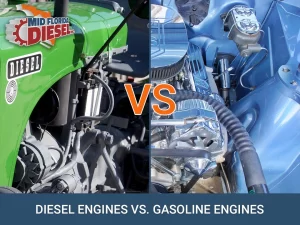Calendar
July 2024 M T W T F S S 1 2 3 4 5 6 7 8 9 10 11 12 13 14 15 16 17 18 19 20 21 22 23 24 25 26 27 28 29 30 31 Search
-
Recent Posts
- Revving Up Efficiency: Optimizing Diesel Engines For Superior Energy Use
- Common Diesel Generator Repair Issues And How To Solve Them
- Selecting The Right Parts For Diesel Truck Repairs
- The Importance Of Regular Oil Changes In Diesel Generators
- Essential Advice For Selecting A Diesel Truck Repair Mechanic
Categories
- Alternative Energy
- Blue Start Power Systems
- Cars
- Caterpillar
- Diesel Engine
- Diesel Generator
- Electicity
- Energy
- Energy efficiency
- Fossil Fuel
- Gas Generator
- Generator Repair
- Generators
- hurricane season
- Hybrid technology
- Hydrogen Fuel Cells
- Jaguar
- John Deere
- Maintenance
- Mid Florida Diesel
- New Technology
- News
- Northern Lights Generators
- Power generation
- Products
- Project
- Reconditioning Services
- Renewable Energy
- Repair
- RV
- RV Repair
- Services
- Solar Power
- Tips
- Track Repair
- Uncategorized
- Volvo Penta
- Yanmar
Author Archives: Web publisher
Revving Up Efficiency: Optimizing Diesel Engines For Superior Energy Use
Energy efficiency in diesel systems has garnered increasing attention as industries strive to reduce costs and minimize environmental impact. Optimizing a diesel engine for better energy use involves comprehensively understanding various factors and implementing specific strategies to enhance performance. In Continue reading
Posted in Diesel Engine, Energy, Energy efficiency, Maintenance, Tips
Tagged diesel, Diesel Engine, diesel engine efficiency, Diesel Engine Maintenance, diesel engine optimization, Diesel engine Service, diesel engines, Diesel Engines Optimizing, Energy efficiency, Tampa
Comments Off on Revving Up Efficiency: Optimizing Diesel Engines For Superior Energy Use
Common Diesel Generator Repair Issues And How To Solve Them
Diesel generators are reliable power sources in various settings, from industrial to residential environments in Tampa. However, like all mechanical systems, they can encounter issues that disrupt their operation. Understanding these common diesel generator repair issues and resolving them effectively Continue reading
Posted in Diesel Generator, Energy, Generator Repair, Generators, Maintenance, Mid Florida Diesel, Power generation, Repair, Services
Tagged #Diesel generators, #Mid Florida Diesel, diesel, Diesel Generator, Diesel generator maintenance, Diesel Generator Repair, Diesel Generator Repair Issues, generator service professional, Generator Services, Generators
Comments Off on Common Diesel Generator Repair Issues And How To Solve Them
Selecting The Right Parts For Diesel Truck Repairs
When it comes to diesel repair, especially in the Tampa, FL area, one of the most critical decisions truck owners and fleet operators face is choosing the right parts for repairs. High-quality replacement parts are essential for the longevity and Continue reading
Posted in Diesel Engine, Mid Florida Diesel, Repair, Track Repair
Tagged #Mid Florida Diesel, Aftermarket diesel engine parts, diesel, Diesel Engine, diesel engine parts, diesel truck repair, diesel truck repair mechanic, Diesel Trucks, OEM
Comments Off on Selecting The Right Parts For Diesel Truck Repairs
The Importance Of Regular Oil Changes In Diesel Generators
The significance of regular oil changes in maintaining diesel generators cannot be overstated. Often perceived as a simple task, oil changes are fundamental to the operational integrity and longevity of your generator. For businesses and residents in Tampa, where power Continue reading
Posted in Diesel Generator, Generator Repair, Generators, Maintenance, Mid Florida Diesel, Power generation, Repair, Services, Tips
Tagged #Diesel generators, #Mid Florida Diesel, diesel, Diesel Generator, Diesel generator efficiency, Diesel generator maintenance, generator efficiency, Generator Engine Oil, Generator Oil, Generator Oil Guide, generator repair, generator repair specialist, generator service professional, Generator Services, Generators, Oil Changes, Oil For Generator, Regular Oil Changes
Comments Off on The Importance Of Regular Oil Changes In Diesel Generators
Essential Advice For Selecting A Diesel Truck Repair Mechanic
Finding a reliable diesel truck repair mechanic is crucial for ensuring your vehicle operates efficiently and safely. Diesel trucks, known for their durability and performance, require specialized knowledge and tools for maintenance and repair. This article offers comprehensive advice to Continue reading
Posted in Diesel Engine, Maintenance, New Technology, News, Repair, Services, Track Repair
Tagged diesel, Diesel Engine, diesel engine for a truck, Diesel Engine Maintenance, Diesel engine Service, Diesel engine Service near me, diesel engines, diesel truck repair, diesel truck repair mechanic, Hiring a Diesel Truck Mechanic, truck repair, truck repair mechanic
Comments Off on Essential Advice For Selecting A Diesel Truck Repair Mechanic
Choosing The Right Diesel Engine For Your Needs
Selecting the right diesel engine for your specific needs is a critical decision that can affect performance, efficiency, and longevity, especially in the Mid-Florida region, where diverse applications from marine to industrial and automotive are prevalent. Understanding what to look Continue reading
Posted in Diesel Engine, Energy, Maintenance, Mid Florida Diesel, New Technology, Tips
Tagged #Mid Florida Diesel, best diesel engine, Choosing Diesel Engine, diesel, Diesel Engine, Diesel Engine Maintenance, Diesel engine Service, Right Diesel Engine
Comments Off on Choosing The Right Diesel Engine For Your Needs
Reasons For Getting A Home Diesel Generator
Power outages are a considerable nuisance for everyone. They can also lead to other major issues for your family and yourself. There are several appliances in a home that depend on diesel generators. They can make the situation without power Continue reading
Posted in Diesel Generator, Electicity, Energy, Mid Florida Diesel, Repair
Tagged #Diesel generators, #Mid Florida Diesel, diesel, Diesel Generator, Diesel generator maintenance, generator service professional, Generator Services, Generators, Home Diesel Generator
Comments Off on Reasons For Getting A Home Diesel Generator
Diesel Engines VS. Gasoline Engines
Gasoline and Diesel are both petroleum products. Although they come from the same origin, they will have a lot of differences in their utilization. Diesel is usually utilized for bigger machinery that needs greater torque over HP. Gasoline, in comparison Continue reading
Posted in Diesel Engine, Energy, Mid Florida Diesel, Services, Tips
Tagged diesel, Diesel engine Service, diesel engines, Diesel vs. Gas Engines, Fuel Efficiency, Gas engines, Gasoline Engines, Gasoline or diesel engines
Comments Off on Diesel Engines VS. Gasoline Engines















